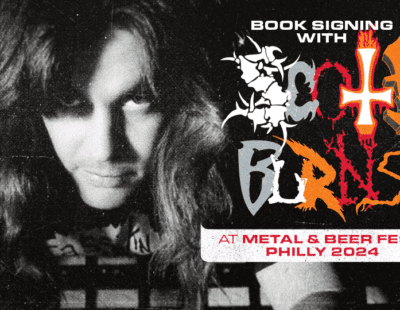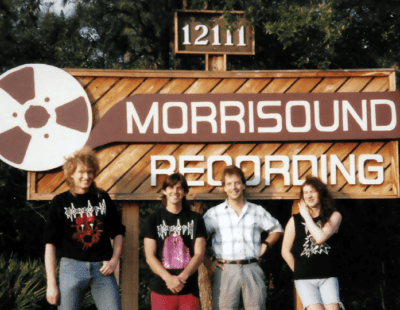
Keith Morris is one of the founders of hardcore punk in Southern California. While working the counter of his father’s Hermosa Beach bait shop he moonlit as the original (and some claim the best) vocalist for the iconic band Black Flag. Morris fronted Black Flag as the band played for largely hostile audiences, appeared on the debut EP Nervous Breakdown, and quit when it stopped being fun. After he left Black Flag he founded Circle Jerks, another California hardcore staple that released essential albums like Group Sex, Wild In The Streets and Wonderful. During his 80s heyday Morris partied even more than he played music: his riveting memoir My Damage: The Story of A Punk Rock Survivor (Da Capo Press) is filled with stories of excess, blackouts, near misses and bad decisions. Morris got sober in the late 80s and continued his remarkable career. Lately, the 61-year-old has remained busy with Off! and Flag, a band comprised of Black Flag originals. Morris talked to Decibel about his book, how he ended up like his father and the night Spinal Tap and Slayer opened for Circle Jerks.
When did you decide to write your memoir?
It wasn’t a decision that I made. I had a close friend Brendan Mullen. He was responsible for punk rock in Los Angeles because he ran the Masque, which was our Ground Zero. We became close over the years and one night I ran into him at an art exhibit that spilled onto the street. We got bubbly and we got into a brodeo (laugh). We were going back and forth and he said ‘it’s time for you to write a book.’ I was going to work on it with Brendan but he suffered a massive stroke and died. I knew that I’d lived through enough fun and fantastic scenarios that maybe I should someday write a book. But I didn’t sit down and consciously make an effort like: “I need to write this and it has to be done in a year.” I just started chipping away. I’d written like six stories, but I get long winded and start talking in circles and add all these details and there’s more stuff than what needs to be there.
You mention in My Damage that your memory was sometimes foggy for parts of the book covering the years before you got sober.
Sure, there were blackouts and haze and fog and moments of ‘non-clarity.’ But I have been sober since 1988 and it’s given me a lot of time to think about things. While I was working on the book with Jim (Ruland) we got into his car and drove around to a lot of these spots in Southern California that were brought up in the book. He’d do everything he could to coax memories out of me – like we’re at the (site of the) Masque and he’d ask about a show. Or, we’d go to where Black Flag and the Germs played for The Decline Of Western Civilization. My co-writer did a great job of sucking stories out of me. He just took that Hoover vacuum to the side of my head and went fucking full blast.
How did the two of you work?
We spent hours in my living room recording stories. Jim would start each tape with the day and the time. That way he didn’t look at a table full of mini-cassettes. He’s responsible for the pacing. I’ve heard that the book moves like one of the songs I’ve recorded. If I had been left to my own devices I would still be writing. At one time, I looked up to Henry Rollins because of his work ethic. I can’t say that now but won’t get into the gory details. When he had a publishing company he told me I’d end up rewriting a book five or six times. And we ended up rewriting this like five or six times.
Was it bittersweet to visit some of these old places?
Actually, no. I was only bummed out about (Morris’s hometown) Hermosa Beach. We have progress but it isn’t always a great thing; sometimes it knocks down things that mean a lot to a lot of people. Hermosa is a prime example of what was once one of the greatest places on Earth. One of the last times I was there it looked like a playground for uppity corporate kids. It was like spring break West without the bikini or wet tee-shirt contest. It seemed to be a contest as to who could be the most uppity or arrogant.
Reading the book you get a real sense of the eclectic side of Hermosa Beach: jazz nightclubs, record stores, used bookstores. A lot of the ideas that you carried to hardcore came from your backyard.
In our community, there was a smaller community of people you’d call free thinkers. There was also a conservative faction of people in the community and they eventually created this scenario. Slowly, conservatives ended up running out the open-minded people and people who didn’t have their head in a box. My old man was asked to join the city council once. At the first meeting, he suggested something and they said: “we can’t do that.” And he stood up and said: “fuck you, I’ve been a business owner in this town for years. I don’t need to deal with you people.” Ultimately we go back and forth about how we don’t want to be our parents but at the end of the day we pick up certain things from them – there is no getting away from it.
My Damage gets into your relationship with your father a lot, particularly the moment when you told him you’d been taking money from his bait business before you became sober.
I grew up not liking my Dad. It was always boss and employee. I didn’t come to the realization how much he meant to me until I had that conversation with him. I was probably about a year into my sobriety when it happened. I had that conversation with him and it was the moment when this weight was lifted off of my shoulders. It was probably the greatest moment of my life. I’ve had a lot of great moments in my life with bands and girlfriends and traveling but that was the most enlightening moment I’ve experienced.
As you were writing the book, did it occur to you how many things could have gone wrong?
What it did was reinforced my feeling that I’m happy to be alive. I still get angry but it fuels my tank when it comes to being creative and making music. People always tell me I’m going to have a heart attack. But I’m a diabetic so I will go out because of a stroke! I’m at the point where I can say I’ve done a lot of great things and a lot of horrible things but I’ve lived an extremely interesting life. I’m happy to be here and I still have a few things left to do.
You write about a gig in Los Angeles that I can’t believe happened…Spinal Tap, Slayer and the Circle Jerks.
Spinal Tap was the opening band, and next was a young and up-and-coming band named Slayer. After that, it was a Circle Jerks lineup with Chuck Biscuits on drums and Flea (Red Hot Chili Peppers) on bass. Of all the shows I’ve ever played for sheer ferocity, that was the night. We looked at the people in front of us and they thought we were these wild animals that would leap off the stage. The Blasters played and after we were done (guitarist) Dave Alvin looked at me and was angry – like how are we supposed to play after that?
Slayer is one of those bands that historically you don’t want to follow.
This was a young Slayer and they were Circle Jerks and Black Flag fans. You have to take into consideration that we were younger and were up to any task placed in front of us. One of the things I learned was never to play after the Bad Brains – that was just insane. It was sheer ignorance and stupidity to walk on stage after those guys. A lot of people are bummed now because H.R. isn’t doing back flips but they are older guys and have different motivations.
As someone who was there for the development of punk and hardcore in the states, what do you think about where it ended up?
Punk was certainly scooped up and taken advantage of by the music industry and the big labels. I’m raising my right hand here because I am guilty of going along with some of that crap. In all of my musical adventures, a particular portion of my rock and roll road trip involved a record that should have never been made (Oddities, Abnormalities, and Curiosities, released by Polygram in 1995). That was us taking advantage of a carrot in front of our nose.
It’s not exactly surprising when people try to commercialize creativity
Right, but things progressed so far that bands started to record just to please certain people they didn’t care about before.
One of the things I never knew about you until reading this was your side career working as an a&r rep for record labels.
Well, if you think being a punk rock star is about limousines and mountains of cocaine remember this rule: don’t give up your day job.
Any chance we could ever see the Circle Jerks together again?
I’m not really thinking about it. A lot of crap went down and years of bad decisions. I’m not that interested in working with them and they are all doing other things. The Circle Jerks became based on what was happening with one guy. I’m not saying that it will not happen because I don’t know. But as long as I’m surrounded by the people I’m surrounded by I am happy with my creative endeavors.






